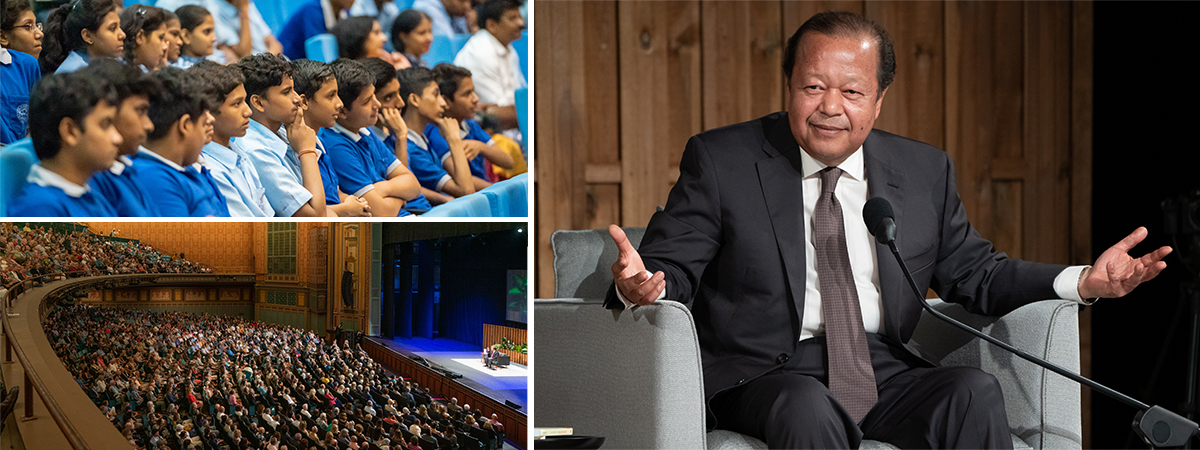Topics
 00:01:48
Where Are You?
Audio
Duration : 00:01:48
In the map of life have you got that peg squarely pegged that says 'you are here...
00:01:48
Where Are You?
Audio
Duration : 00:01:48
In the map of life have you got that peg squarely pegged that says 'you are here...
In the map of life, have you got that peg squarely pegged that says, “You are here”? Because if you don’t, the map doesn’t mean anything. It’s pretty—but that’s all it is!
Everything in that map only makes sense when that pin is clearly there, that says “You are here.” That is the importance of knowing where I am. But having the map and not knowing where I am on that map, renders the map useless.
So, everything in you do in your life, literally has been to create the map: “Here is my son; here is my daughter; here is my house; here is my job; here is my uncle; here is my nephew; here is my this; here is my house; here is my work; here is, you know, where I live; this is what I do; this is my town; this is my city.”
You’ve been working to create your map—and that’s what you try to maintain! But if in this map, you do not know where you are? Useless!
– Prem Rawat
 00:01:52
Gratitude
Audio
Duration : 00:01:52
One of the meanings of gratitude is fulfillment.
00:01:52
Gratitude
Audio
Duration : 00:01:52
One of the meanings of gratitude is fulfillment.
A lot of people want to be thankful. They want to have gratitude. But there is a problem. You cannot have gratitude without gratification. You have to have gratification. And you know what one of the meanings of gratification is?
One of the meanings: to be fulfilled. Fulfillment. If you want of feel gratitude in your life, great! How do people express that? Smile. Have a nice day! I wish it was that simple. Somebody says, “Have a nice day” And you go, “Oh! Great now I’m going to have a nice day.”
See, real gratification is what you need. And when there is real gratification, gratitude is automatic.
People ask me what should we be thankful for? It’s a trick question; it cannot be answered. If you don’t have gratification, trying to pretend that you are grateful will never happen. But when you have gratification, when you have that fulfillment in your life, gratitude is automatic. You don’t have to work on it. That just happens.
- Prem Rawat
 00:05:04
The Pursuit for Power
Audio
Duration : 00:05:04
Realize that all along you have been powerful.
00:05:04
The Pursuit for Power
Audio
Duration : 00:05:04
Realize that all along you have been powerful.
There was a guy, and his job was to go every day to the mountain. And he would cut a piece of rock; he would take the rock, bring it back home, and he would make little things from that rock. He would make mortar-pestle, small statues—and he would sell them. And this is how he made his living.
So, one day he was very sad. And he was walking along the street—and he was just sad with his situation, because he saw no future, and he did not like his lifestyle. So he heard noise coming from behind the wall; he just heard some noise coming. So he stood on his tiptoes and he looked!
And it was a beautiful house! And they were having a party. And there were servants! And there were guests! And there was music! And people were dancing! And he went, “Wow! The person who lives in this house, he must be really powerful. I, I want to be like him!”
So he looked up, and he prayed. “God, I want to be like him.” It just so happened that that day, God was listening. And God said, “Okay!” And he snapped his finger—and the man had become rich!
And he said, “Now, this is more like it! I like this. I am powerful! I have servants! I have a house! I have rich friends! Ah, this is really good!” And he was enjoying it.
One day, a procession went by, and he just heard all the noise, so he came out of the house and he looked—and it was the king! And he was going.... And all the rich men were lined up bowing to the king! And he said, “Wow! This king is more powerful than me! God, I want to be like the king!”
Also that day, God just happened to be listening. Just like that, he was the king! Big army, lots of servants—everybody paying respects to the king.
One day, he came out to his balcony in the morning and he saw the sun rising. And as the sun rose, all the birds started to wake up. All the animals started to stir! It’s like, “Wow! This sun is more powerful than me!” So he looks up, prays, “I want to be like the sun!”
Just like that, he’s the sun! And one day he’s shining really bright; it’s really hot—and he sees there’s something between him and the earth. And he looked—and it was a cloud. And the wind was blowing and moving the cloud. “Wow! The wind is more powerful than me! I want to be the wind.”
Well, he becomes the wind. He blows! Nothing can stop him—he goes wherever he wants! He’s blowing, blowing, blowing, blowing, blowing! And all of a sudden he’s stopped! “What’s stopping the wind?” He looks—and it is a big mountain. “Ah! I want to be the mountain. More powerful....” He becomes the mountain.
Very happy. Most powerful. Mighty! Strong! And one day he notices that somebody is cutting the mountain! And he goes, “Who can be more powerful than this mountain? Cutting the mountain?” And he looks, and way down there is a stonecutter, just like him, cutting away at the mountain.
In this moment he realized that all along he has been powerful, but he did not know it. Same thing for all of us.
– Prem Rawat
 00:02:02
A Singular Focus
Video
Duration : 00:02:02
Prosper! Bloom. Be fulfilled.
00:02:02
A Singular Focus
Video
Duration : 00:02:02
Prosper! Bloom. Be fulfilled.
The question becomes: is the focus to have that joy in this life? Is the focus to be content, to be fulfilled? Or is the focus on bewilderment? What do you entertain as a thought every single day? Gratitude? Or “I wonder what’s next?”
You have both possibilities. You have the possibility of being in a place where you entertain that one singular, most beautiful thought of gratitude, of fulfillment. Or you have the possibility of bewilderment.
Bewilderment will not bring you gratification. Never has, never will. Knowing, feeling, experiencing will. Don’t let them go to waste. Don’t. Live your life consciously in gratitude, in knowing, in clarity, in simplicity—and prosper! Of course, prosper! Absolutely, prosper! Bloom. Be fulfilled.
- Prem Rawat
 00:06:51
Collecting Joy
Video
Duration : 00:06:51
If you start seeing reality in what is a dream—no problem: reset.
00:06:51
Collecting Joy
Video
Duration : 00:06:51
If you start seeing reality in what is a dream—no problem: reset.
You have even made growing old a problem for yourself. It’s not a problem. That’s just what happens. You know, that’s just what it is.
Ask any person who has restored a car. When you’ve got a nineteen-twenty-nine Model T Ford, and you’ve restored it, don’t go driving it like you would have back in 1929, trying to, you know...?
What—what gave us the hotrods? It was prohibition. They were running—they were bootlegging; they were running all the booze in these cars. And they wanted these cars to be as light as possible, so they removed the hood; they removed the mudguards; they removed as much as they could, to lighten the car up, so it could outpace the cops.
And people liked that so much, that even when they stopped the prohibition, people kept the cars that way.
You know—you know, you won’t drive an old car like that. You drive it gingerly, nicely—because it’s old. It doesn’t mean you’re not going to drive it; of course you’re going to drive it. And that doesn’t mean you’re not going to appreciate it; of course you’re going to appreciate it. It’s beautiful in its own way.
I had one, and I used to sit down in it and just look at it, you know, it’s like, “Wow, look at this thing.” For the gas gauge, it was right on the dashboard in the middle, and it was attached to the gas tank; the gas gauge was actually attached to the—and you could see the gas.
And what it was, was a spline that was twisted, and on this spline was mounted the gauge—that went from “full” to “and half,” and all those markings. And there was a cork in it.
And as the gas went down, this thing rotated like this, because it always floated on top of the gas. When it got to the bottom, it said, “E.” And then when you filled it all the way up, it rotated like that; it went to “F.” And when you drove on the road, you hit a bump, and the gauge would go like that, because the gas was doing that.
And then, even though the concept wasn’t of a cruise control, but it actually had a throttle lever. So you got going, and you took it, and you put it where—because you didn’t want to push that gas all the way. But, just, you’re driving along, and you could tune the car. You could advance the timing, retard the timing. You could change the carburetor settings.
So, you got it going to about fifty miles an hour, and then you moved these levers to change the timing and make it a little bit richer, or make it a little bit leaner on the carb. And pretty soon, the thing will start accelerating. And you’d go one mile an hour faster, another mile an hour faster. And they were just a blast. You know, and you’d hit the horn, and it went, “Arrrarghk!”
But you would drive it very gingerly. And it’s like, “Oh, no, it’s a problem.” “What is the problem?” “Oh, I can’t—I have trouble walking; I have trouble seeing; I have....” Get a nice chair at home; park yourself; bring the TV really close up, to where you can see it....
What is the purpose—to be normal or enjoy your life? No, but you, everybody wants to be normal. “And, nah, no, no, keep the TV over there, and see if I can see it....” So you’ve got binoculars, uh-huh.... And what for?
So, garner focus in your life; garner clarity in your life. Collect that joy in your life. Those are the things that are real. Everything else comes, goes, comes, goes, because it’s only a...it’s only a dream.
Sometimes the dream is good, and then sometimes the dream is not so good. Those who don’t go jumping up and down when it is good and lamenting when it is not so good, have a smoother sail in life.
If you get off that tack and you start seeing reality in what is a dream—no problem: reset. No problem! It’s not like, “Oh my God. Oh my God. Oh-my-God; oh-my-God. God’s going to take off points for that. There goes another day in hell. I mean, and my goodness, you know?”
No! No, no, no, no, that’s all fear. Hell is right here; heaven is right here. If you’re not in heaven, guess where you are? It’s as simple as that! It’s simple math!
It’s simple math. It’s a simple math. “Know. Know”—not believe. Know where you are, always. It’s all you need. All you need.
- Prem Rawat
 00:13:46
Clear Path
Video
Duration : 00:13:46
An excerpt from Amaroo 2018 Series Episode 5
00:13:46
Clear Path
Video
Duration : 00:13:46
An excerpt from Amaroo 2018 Series Episode 5
The beginning of the year, I was in England—and I had to do a lot of driving. Usually I spend more times in airplanes than cars. Well, England changed that; I spent more times in cars than anywhere.
And—ah!—London gives a new meaning to the word “traffic.” I mean, you’re driving only two kilometers, so, and it’s going to take you forty-five minutes. Absurd! So, I’m sitting in the car, and this and that, and then nothing much to do. Music is playing; I’ve figured that out. You know, I got a nice playlist, so…“and maybe I can listen to it....”
I see this man. But first, actually, I saw this lady. So, the car was parked here, and this lady is coming. And she’s got a bicycle, and one hand is holding the handlebar—she’s walking—and she’s, with the other hand, going, “dah-dah....” And she’s talking.
And I looked at her. And it’s like, I felt sorry for her. Because, with one hand on the bicycle handle, and then talking. And there was nobody else there except her. And I felt sorry for her; it was like, “Looks like she lost her marbles.” And then when she came closer, I realized she had her Bluetooth headphone on, and she was on the phone.
Well, that made me feel a little old. It’s like, “Geez! You’re not with the program, sir.” Because, believe me, when I was growing up, you see somebody just talking to themselves on the roadside, you knew they’d lost their marbles. Those were the only ones.
There was a guy in Dehradun who was like that. Sometimes you would see him at the crossroads, doing “police work,” you know, just “handling traffic.” And then sometimes you’d see him somewhere else, and sometimes you’d see him somewhere else, and....
It’s like, “Oh! Okay, don’t be so judgmental, you know. She’s just having a phone conversation.” And then I see this other guy, and he comes through—and he’s zipping right along! He’s got a white stick. And then I realize he’s visually challenged.
And he’s got a white stick, and he’s just going, “Teh-teh-teh-teh, teh-teh-teh-teh, teh-teh-teh-teh, teh-teh-teh-teh, teh-teh-teh-the,” and he’s just clipping right along. And he’s—there are other guys—he’s walking faster than them.
And then of course, the car inches, and I get to watch him. He’s walking faster than the car, believe me. And then the car catches up, and he overtakes. And I realized something.
He’s not looking for obstacles! He’s not looking for obstacles. He’s looking for a clear path. And so far he has a clear path in front of him, he’s good. That’s what he’s searching for. He’s not searching for obstacles; he’s searching for a clear path.
And an obstacle comes, it will—he will feel it, and now he knows that that is not a clear path, and again he will start searching for where there is a clear path. And so, he’s searching for a clear path.
Let me ask you, in your life, you search for obstacles or the clear path? No, you don’t; that’s the problem. I wish you did. You look at the obstacles and go, “Oh, my God!”
Right? Somebody gives you the bad news? You see the obstacles; you don’t look for the clear path; you have no training in your life for “clear path.” You have training to look for obstacles. You know what a problem is. You don’t know what a problem is not.
So, all your life you have been looking at obstacles, “Is that a problem? And is that a problem? Is that a problem?” Why do you look at your watch? To know what time it is? What do you care? It’s relative to something else. “Am I late? Is it time to go on? Is it time to have dinner? Is it time to go to sleep?” Relative to some thing: “Is it time to wake up?”
When you just—when you wake up at night, you look at your clock. Why? Why? Oh, if you’re awake, get up! “Mmmmh, it…” Waking up doesn’t work like that. Waking up works like this. “Okay! I’m ready to get up—but only if it is the right time.” Because, what if you’re up at two o’clock in the morning? Now you’ve got a problem! “And, aaaahhh, God, it’s only two. [snore] Go back to sleep!”
The sum of your life is searching for problems. You’re petrified of problems; you pray for no problems; your prayers are associated with problems. What is the problem with success? “Problems” is the problem with success! Success is not so easy, because there are problems in the way of success.
Problems, problems, problems, problems, problems, problem—no wonder they come your way—all our way. Because we have almost got signs everywhere, “If you’re not a problem, go away.”
And your life becomes completely relative. Isn’t that how you judge your happiness? Isn’t that what “good times” and “bad times” are all about? Rough—what defines a rough patch in your life? “We’re dealing with problems!” Easy patch? Where the…even the problems pity you.
Change this equation. Look for the clear path, not the problems.
For a person who is visually challenged, they don’t see the obstacles. “Obstacles” is not an issue. So far they can find the clear path, it doesn’t matter how windy it is; it doesn’t matter how straight it is; it doesn’t matter how smooth it is; it doesn’t matter how rough it is. So far it’s a clear path, it’s good to go. Find the clear path in your life.
There is light! There is light. Find the light. It’s in you. This last little statement, “There is a light, and that light is in you,” is the statement that has been most repeated by the sages, saints, and all those who wanted to leave the most important message for mankind, that would help us all. The most important message, and that is, “There is a light, and that light is in you.”
Light that candle inside of you. There is a law, the most powerful law there is—amazingly powerful. If you bring a lit candle and an unlit candle together and touch them, touch the heads, this is the law: “The lit candle will light the unlit candle.”
Not the other way around—where the unlit candle will put out the lit candle. No, the law is, “When those two meet, the lit and the unlit, the lit will light the unlit.” And you know how long this law has been in action? When human beings figured out fire, that’s how it happened—a little fire could start a fire in an unlit pyre. Power!
This should be your hope. Not dreaming about accomplishments, not dreaming about all those other things that we dream about. But the hope is to understand this law and practice this law every single day.
Not easy, but easy if you are the seeker of the clear path. Difficult, if you have learnt how to identify obstacles—because obstacles in themselves do not provide the clear path. For that, you have to search.
And so, even a person who’s visually challenged clips right along. Poles—going, whisht! London lights on bridges, right? Not a problem! It’s not a problem. Other people—not a problem. “Tshu-tshu-tshu-tshu, tsch-tshu-tshu-tshu, tsch-tshu-tshu-tschu, tsch-tsch-teh-teh, teh-teh-teh-teh, teh-teh-teh-teh,” and, “whsheeeow!”
Why can’t that simplicity be in our lives too?
— Prem Rawat





